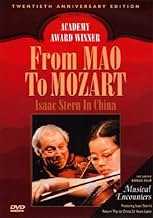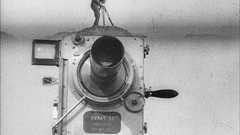Isaac Stern's cultural tour of China is seen, with the master violinist performing and mentoring young Chinese musicians. He visits rehearsals of the Peking Opera, meeting with their musicia...Read allIsaac Stern's cultural tour of China is seen, with the master violinist performing and mentoring young Chinese musicians. He visits rehearsals of the Peking Opera, meeting with their musicians who use traditional Chinese instruments, and also visits a sports academy and other ven...Read allIsaac Stern's cultural tour of China is seen, with the master violinist performing and mentoring young Chinese musicians. He visits rehearsals of the Peking Opera, meeting with their musicians who use traditional Chinese instruments, and also visits a sports academy and other venues. The lingering effects of the Cultural Revolution (1966-1976), which opposed any weste...Read all
- Won 1 Oscar
- 1 win total
Featured reviews
From Mao to Mozart: Isaac Stern in China
excellent, sensitive coverage of the effect of the cultural revolution on musicians in China
Good Look at Music's Wide Range
*** (out of 4)
Oscar-winning documentary follows Isaac Stern's tour of China where he was invited by the government to spend three weeks. The tour included him performing some concerts but the main goal was to introduce children to the world of music, which was something they couldn't learn due to the Cultural Revolution that ran for over a decade. While I haven't seen every nominated film from 1981, I'm not certainly I'd heap too much praise on this film or find it Oscar-worthy but I think it's a pretty interesting look at a place where something as simple as music was taken away from them. This documentary does cover quite a bit of ground as we start off just seeing Stern travel to some rehearsals where he comments on the music playing and we also see the master at work himself. Fans of Stern will certainly enjoy hearing him play but they also get a chance to hear him speak about his craft as he teaches those around him. The film never gets overly political but it does deal with some darker issues of how the people were abused and just never given the freedom to do things that other places take for granted. There's a scene towards the hour mark where a man recounts his time of abuse that is really heartbreaking. I think what the film proves the most is how there's really no language to music and how so many people can be effected by it even if they're from different parts of the world.
the importance of cultural exchange
The documentary does also make sure to note the damage caused by the Cultural Revolution (which China was just coming out of at the time). Whatever the case, this is one fine look at cultural exchange. I wonder if any of the Chinese students whom Stern met remember meeting him.
Entertaining documentary is something special
As guest of the Chinese government, Stern and pianist David Golub visited Peking, Shanghai and other cities, with impressive young native ballet artists, acrobats and musicians all captured on film. The amazing degree of discipline and concentration among young Chinese is evident in every type of activity observed. Arresting travelogue footage of the vast, green countryside and bustling cities is included in the pic for transitions.
Though brief concert performances by the duo are featured, Lerner concentrates on numerous rehearsals and auditions to give a candid view of what amounts to cultural shock. Stern is no diplomat, but his colorful criticisms of the young players' technique and lack of emotion in their playing pays off in priceless lessons from a truly gifted teacher. The reaction of the huge rehearsal audiences and the improvement in the players' work justifies Stern's lack of tact. Throughout, his emotional commitment to music is the film's inspirational hook.
Stern and Golub narrate various segments, giving their impressions of the trip, while Tan Shuzhen, deputy director of the Shanghai Conservatory of Music, narrates a most revealing segment dealing with his students. Shuzhen reports on his harrowing 14-month incarceration and other horrors during the Cultural Revolution that started in 1966, and concisely discusses the need for openness in music, which is why the tour and film came about in the first place.
Though ostensibly a music documentary, picture succeeds due to Lerner's visual rendering of human faces. Editing, photography and sound recording are all top-notch. Already nominated, pic looms as a heavy Oscar contender and merits specially-handled commercial bookings based on its entertainment and educational value.
Did you know
- ConnectionsEdited intoThe Music of Strangers (2015)
Details
- Release date
- Country of origin
- Official site
- Languages
- Also known as
- 毛沢東からモーツァルトへ/中国のアイザック・スターン
- Filming locations
- Production company
- See more company credits at IMDbPro
Box office
- Gross US & Canada
- $1,205,934
- Gross worldwide
- $1,205,934




















